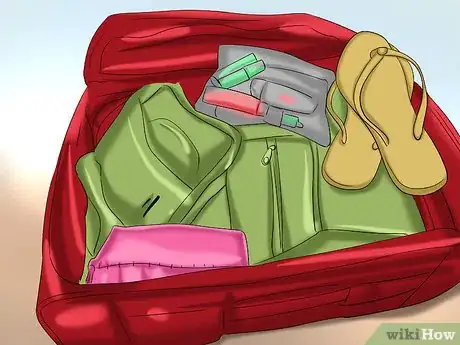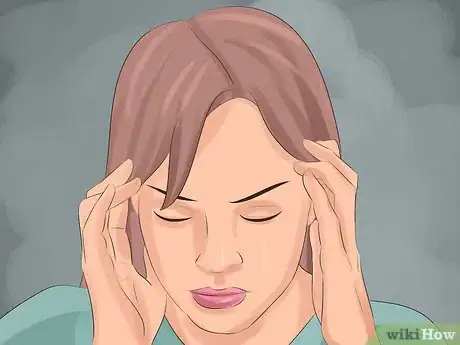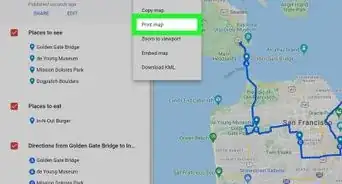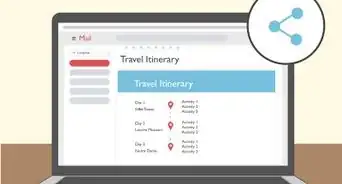wikiHow is a “wiki,” similar to Wikipedia, which means that many of our articles are co-written by multiple authors. To create this article, 21 people, some anonymous, worked to edit and improve it over time.
wikiHow marks an article as reader-approved once it receives enough positive feedback. In this case, 94% of readers who voted found the article helpful, earning it our reader-approved status.
This article has been viewed 63,592 times.
Learn more...
A trip to the holy is the trip of a lifetime! Many people prefer to embark on such a quest via a "guided tour"- but what if you're looking for a more unique experience? While it may seem daunting to consider from half a world away, it is possible to travel quite safely in this area, and bring home a different set of memories than a guided tour could provide.
Steps
-
1Get a travel guide beforehand.[1] This is mostly to get some ideas about what you want to see, matched up with how long you plan to stay. Do you want to stay on the move and see everything, or concentrate your time in a couple of places, and make some new friends? You might even get invited to a Shabat dinner, if you're lucky...
-
2Set a good itinerary. Or, just go where the bus takes you...A decent itinerary might have you landing at Ben Gurion (where you should expect to be efficiently profiled, separated, and quizzed by smiling young Israelites), with a quick trip into the very cosmopolitan Tel Aviv (which is hardly in the holy land, by most accounts) for lunch, and then on to Jerusalem for your first couple of days; putting off a decision to head north or south until later, when you've determined whether to head into the more populous, workaday north, or the arid south through the Negev desert and the bulk of the Kibbutzim (Kibbutzes) to Eilat, the "resort" destination for Israelites, on the way into the Sinai (they pronounce it SINeye)...there is much to see here, in either direction; why not do both?Advertisement
-
3Understand that Israel is very expensive. You will definitely want to concentrate at least some of your time in Jerusalem; it is the city of God, and a central reason for most people's trip to the holy land.
- Unless you are comfortably well off, hotels are going to take a big bite out of your budget in a hurry. Consider staying in hostels, which can still run you up to $60 a night or so, in Jerusalem, less elsewhere; they are a much better way to soak up the local color, anyway.
-
4Understand that they are all broke. This is hardly an understatement; begging is a respected profession here, but the beggars do fine, and they are not pushy.
- The average starting wage in Jerusalem is about $8 an hour; A small two bedroom apartment is about $1000 a month, or more. Most people work; 6 days a week, 12 hours a day is common. They are mostly all smiling- you will see very few dejected people here.
- The statement that they are "all" broke is possibly misleading, as this applies more to the younger set, which is typically less affluent anywhere. Even most of the younger set manages to have in home internet, possibly a car, etc.
-
5Come prepared for the weather. The north is quite a bit more temperate than the south, with four seasons. The "high" season in the south runs from October to March, when it is merely hot- but dry, and quite comfortable in sandals and shorts.
-
6Remember the Sabbath (Shabat). Virtually the entire country shuts down from Friday at sundown to Saturday at sundown, except for the Arab businesses, and essential services. This won't seriously affect you, as the Arabs run many of the stores, but don't plan on traveling or changing hostels during Shabat. Interpret Armageddon instead.
-
7Ignore your misgivings about any Israeli/Palestinian tensions. It is news, so you see the "sensational" part. They don't really hang out together, but there is much less tension than major American cities; and this is a well run country.
- Dinner in east Jerusalem with Palestinians met in Old Town, Jerusalem, at the bazaar, was memorable. Unless you are of Arab descent, you probably won't go to the West Bank, or get into the Dome of the Rock; but, unless you're black, you probably wouldn't go to Watts or Compton, either, and they are both larger and more violent.
- It is against the law to carry even a pen-knife in Israel.
-
8Understand that Israelites eat differently. Pulling something out of the freezer, and putting it into the microwave, is a foreign concept here; everything you eat during your stay in the holy land was made that day; every cup of tea is made with green leaves, and every glass of juice is squeezed while you watch. And it all costs up the wazoo. Lunch will run you about $10 a day, but you will remember each meal a year after your return.
- You can save considerably by grocery shopping, but this isn't always practical when traveling. Their "grocery stores" are little Jewish or Arab quickie-mart sized places, but there the similarity ends. Still expensive by American standards, expect a great selection of nuts (20 different kinds is common; raw or...fry-glazed?), stuff that looks like Slurpees, only real fruit, and delectable, and they most amazing flavors of fruited gelato.
- The Arab stores are much more interesting, but don't bring Arab food to hang out with Jewish people; it's not like it causes a scene, but Jewish people eat kosher, so you may not be able to share- and sharing is a big part of this whole experience. Veggies, fruits, and nuts are kosher anyway, but they prepare them differently. Kosher food is great, too, but simpler.
-
9Recognize that Israelite does not mean Jewish. This distinction is hard to communicate, but it will make itself known in little ways as you relate to the people here- some of the things that you will inevitably say will be met with an uncomprehending look.
- Israel is a country, while Jewish is a religion; there are also Muslims, and Christians here, all Israelites. Their government is Israelite, and they pretty much all feel about their government the same way you might feel about yours; it's their religion that plays a more central role- however, although you will certainly see Orthodox types, don't be expecting to be constantly bumping into people reading their holy book, or anything; this is a private matter to them, and there is no proselytizing here- and that means you.
- It all combines very delightfully, actually, to provide a distinct sense of spirituality, and a notable lack of religiousness.
-
10It's cheaper in the Sinai. Expect to keep paying if you head north; but for whatever reason, since Eilat, on the way down to the Sinai, is one of their nicer resort areas, at the top of the Red Sea, in the south, it's less expensive there. You'll still probably want a hostel, for the flavor if nothing else.
- This is possibly because it's not exactly crowded, like Jerusalem, even on the weekends. A good guess might be that Israelites work so hard, and vacation less; and Eilat is five hours away from Tel Aviv or Jerusalem (the major tourist centers)by bus, with little in between, except Kibbutzes in the Negev desert.
- If you're interested, you can walk right in, more or less, to a Kibbutz for a quick visit, but they are busy little Gardens of Eden, right there in the middle of the Negev; so if you want to stay the night, which is highly recommended, get online and set it up beforehand.
- Expect communal dining and hostel-type accommodations; simple but solid, run by young Jewish interns; they pretty much grow everything- think combination plantation/farm.
- The only reason you'll ever want to leave is because it's pretty warm during the day (although quite dry), even in high season, and the Red Sea is calling you- you should bring empty suitcases for shopping in the Sinai, even if you're a nomadic type; the stuff there is just too cool, and too cheap.
- If you're interested, you can walk right in, more or less, to a Kibbutz for a quick visit, but they are busy little Gardens of Eden, right there in the middle of the Negev; so if you want to stay the night, which is highly recommended, get online and set it up beforehand.
- After the Israeli/Egypt border, headed south, you are truly in the frontier now; an hour and a half taxi ride (for like $30) will get you to Dahab, a charming little backwater right on the Red Sea; a diving and snorkeling mecca for Europeans.
- Now even nomads can afford a hotel, but staying in a "camp" is probably still preferable, as they are cheaper, and you aren't going to be in your room, anyway.
- Air conditioned rooms with mosaic floors surround charming little courtyards with lots of palms and Bedouin style open tents for evening gatherings, for about $20 a day for two, or even less. The room held $3000 worth of musical instruments and previously purchased souvenirs, and the padlock, unused, was unnecessary.
- Now even nomads can afford a hotel, but staying in a "camp" is probably still preferable, as they are cheaper, and you aren't going to be in your room, anyway.
- The Bedouins are easy-going, like the Egyptians, and will set you up with a driver to Mt. Sinai if you're so inclined. Little Bedouin girls (that speak whatever language you speak) sell you clever shell and wood jewelry for a dollar while you sit under a tent smoking a Sheesha by the Sea, waiting for your grilled seafood.
- Average per capita income in the Sinai is high for Egypt, about $130 a month, and the living is easy. Lease a brand new, sea-front condo for about $400 a month or less, if you decide not to return. Your whole trip, from America at least, is visa-free, too!
- This is possibly because it's not exactly crowded, like Jerusalem, even on the weekends. A good guess might be that Israelites work so hard, and vacation less; and Eilat is five hours away from Tel Aviv or Jerusalem (the major tourist centers)by bus, with little in between, except Kibbutzes in the Negev desert.
-
11Don't miss the National trail. If you have an extra month or two, take the trail from Eilat all the way up to Dan, in the north- for free! Stop at Kibbutzes along the way for free room and board, where they will aid you in continuing your journey. A good backpack, excellent hikers (open-toed shoes, in other words), and a canteen are all you really need.
- This is a very spiritual way to see the holy land; walking with mostly Jewish pilgrims, listening to their stories- simply an experience you will never forget. You have to be willing to let go to do this, and be willing to roll with things; anecdotal stories here are precious things, however, and you will be glad to have your own to tell, if you wish.
- This is not for the faint-hearted, and you should be in decent shape when you start; you'll definitely be in amazing shape when you're done. Enjoy your trip to the Holy Land.
- This is a very spiritual way to see the holy land; walking with mostly Jewish pilgrims, listening to their stories- simply an experience you will never forget. You have to be willing to let go to do this, and be willing to roll with things; anecdotal stories here are precious things, however, and you will be glad to have your own to tell, if you wish.
Community Q&A
-
QuestionIs it safe to go there?
 Mark WhittingtonCommunity AnswerLike any place, some areas are safer than others. It should be understood that tourism is a huge part of the economy, and your biggest fear should likely be getting taken advantage of monetarily.
Mark WhittingtonCommunity AnswerLike any place, some areas are safer than others. It should be understood that tourism is a huge part of the economy, and your biggest fear should likely be getting taken advantage of monetarily. -
QuestionWhere is the best place to stay to do holy land touring, Tel Aviv or Jerusalem?
 Mark WhittingtonCommunity AnswerTel Aviv is strictly Israel, Incorporated, and Jerusalem would be my recommendation.
Mark WhittingtonCommunity AnswerTel Aviv is strictly Israel, Incorporated, and Jerusalem would be my recommendation.
Warnings
- If you are a female, make sure to cover up as your skin could be offensive to some.⧼thumbs_response⧽







-Step-3.webp)































































